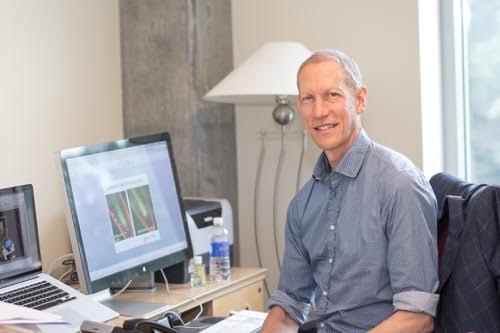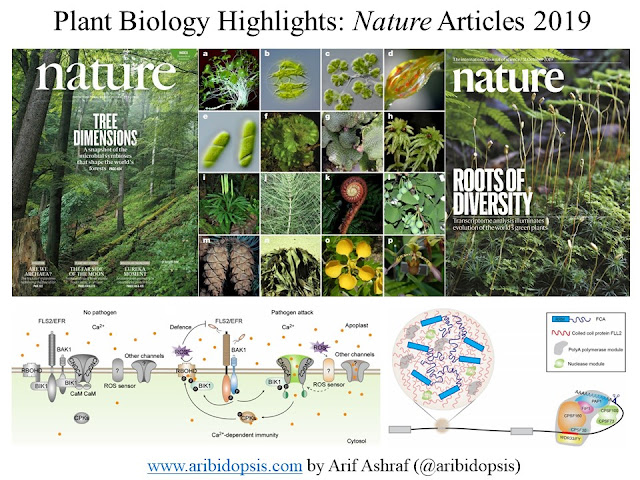Philip Benfey's Interview
Philip N.
Benfey is currently Paul Kramer Professor and
Director of Duke Center for Systems Biology; and Howard Hughes Medical
Institute (HHMI) Investigator. He graduated
from the University of Paris and received his PhD in Cell and Developmental
Biology from Harvard University under the guidance of Dr. Philip Leder. He did
post-doctoral research at Rockefeller University in the field of Plant
Molecular Biology working with Dr. Nam-Hai Chua and was appointed an assistant
professor there in 1990. In 1991 he moved to New York University where he
became an associate professor in 1996 and full professor in 2001. He was the
founding director of the Center for Comparative Functional Genomics at NYU. In
2002 he was named professor and chair of the Biology department at Duke
University and in 2003 was named a distinguished professor.
Benfey is the
recipient of a Helen Hay Whitney post-doctoral fellowship and an NSF pre-doctoral
fellowship. He was named a Fellow of the American Association for the
Advancement of Science in 2004 and was elected to the National Academy of
Sciences in 2010. In 2011, Benfey was named an HHMI-GBMF Investigator by The
Howard Hughes Medical Institute and the Gordan and Betty Moore Foundation under
an initiative to support fundamental plant science research. He currently
serves on the editorial boards of Science, Developmental Cell, and BMC Plant Biology.
His research focus is
to understand how cells acquire their identities. To answer this question, he
uses Arabidopsis thaliana root as a
model system because of its simplicity, organization and organized pattern. His
lab employs the combination genetics, molecular biology and genomics to study
the genes necessary for root development along with radial and longitudinal
patterning. His lab discovered two genes, SHORT-ROOT and SCARECROW, important for
radial patterning of roots. His long term goal is to understand how cells are
generated from a stem cell population and how they become patterned and
integrated to form functional organ.
He is also a pioneer
of cutting edge technology of plant biology. His lab invented a device called
RootArray; which allow scientists to grow 60 to 120 seedlings at a time. In
this device, it is possible to observe the response of plants and tagged genes
too. In 2007, he formed a start-up company,
GrassRoots Biotechnology, based on this technology; which uses systems biology approaches to develop new
crop traits for the bioenergy, food, and industrial markets.
What is your story to get interested in plant biology,
and who influenced your scientific thinking early in your career?
I consider myself to be an “accidental scientist” as I
originally wanted to be writer. I dropped out of college after a year, worked
for a logging company in Oregon, then for a ski area in Utah. At that point, I
had to decide if I wanted to go back to college, and opted instead, to
hitchhike around the world on sailboats. Unfortunately, I kept hitting
hurricane season, so I didn’t do any long journeys on sailboats, which may be
why it took me 5 years to get around the world. I worked as a mechanic in the
South Pacific, as a bricklayer’s laborer in Melbourne, on the railroad for the Mt.
Newman Mining Company in Western Australia, then traveled through Singapore,
Indonesia and the Philippines. I worked as a gardener in Japan and began a
novel. A year and nine months later, I was only half way through the novel and
ready to move on. So, I took the Trans-Siberian railroad across the USSR,
arriving in Moscow after eight days and seven nights, very hungry and in need
of a shower. I left the USSR on a boat from Odessa, then traveled through
Europe ending up in Paris. There, I worked as a carpenter on a barge that was
being transformed into a community center. About the same time, I fell in love
with a French woman who was attending law school in Paris. I thought it was a
pretty good arrangement – she would be a wealthy lawyer who could support me as
a struggling writer – until she made clear that her goal was to be an actress.
At some point she said, “Not that I don’t have entire faith in your writing
ability, but maybe a day job would be a good idea.” To which, I replied, “But,
what would I do?” And, she suggested biology. So, I finished my undergraduate
education at the University of Paris, then did my thesis at Harvard.
What scientific discoveries over the past couple of
years have influenced your research directions and how?
The primary influence over the past few years has been
technology breakthroughs. These have included the drastically reduced cost of
sequencing, the elucidation of genome editing systems and availability of enhanced
imaging platforms.
What do you think will be the next big thing in your
specific area of study?
In the field of plant developmental biology, we now
have the ability to design and test synthetic circuits, which should help us
understand how gene regulatory networks function.
What inspires you to continue in science?
Science is one of the few professions in which we
consciously try to reduce obscurity. It is all about adding new knowledge,
understanding something that was previously hidden. There is also the creative
aspect - you can have an idea in the morning and act on it the same day.
If you had six months off, what would you do with your
time?
I’d devote more time to running my new company whose
aim is to use sophisticated data analytics to improve crop breeding and human
health.
If you were able to repeat your years as a graduate
student, would you do anything differently?
I don’t think so. I had a great graduate advisor in
Phil Leder at Harvard. He was very supportive as I learned humility in the face
of science. He also had a life outside of the lab, which was a very good
example.
What do you think are good career moves for young
scientists, and why?
I think there is real value in working outside of
academia for some period of time. The easiest is to get out between
undergraduate and graduate school, but it could be at other times as well. This
can provide a valuable perspective, particularly during the frustrating periods
of science. I would also suggest that you should watch out when you feel too
comfortable. Stretch yourself in terms of areas of interest, techniques,
approaches.
As an employer, what are the five key qualities you
look for in a potential team member?
I look for people who are smart, have good hands, have
quantitative skills and are socially adept.
What advice would you give to a student interested in
plant biology today?
If you
want to address the critical issues facing the world, most of them involve
plant biology. Food and energy security, climate change and social inequality
can all be addressed through improved understanding of plants.
This interview was published in American Society of Plant Biologists (ASPB) newsletter in Sep-Oct 2016 isuue. The interveiw was taken by me as a Graduate Student Ambassador of ASPB.





Comments
Post a Comment